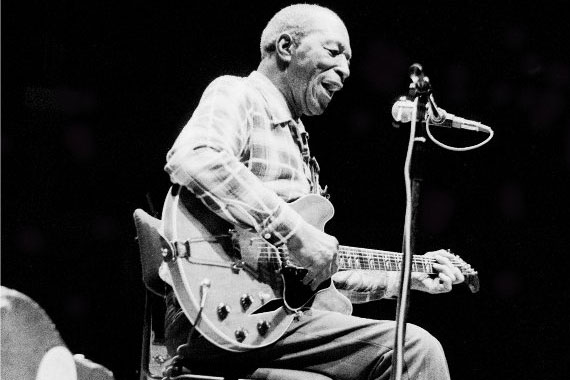<Back to Index>
- Guitarist and Singer Luke Jordan, 1892
- Guitarist and Singer Carl Martin, 1906
PAGE SPONSOR

Luke Jordan (January 28, 1892 or November 1893 - June 25, 1952) was an American blues guitarist and vocalist of some renown, particularly in the area of his home, in Lynchburg, Virginia.
Sources conflict on Jordan's birthplace. Some sources list his birthplace as Appomattox County, Virginia, or Bluefield, West Virginia. According to his World War I draft registration card, Jordan was born in Lynchburg, Virginia. At the time of his registration on June 5, 1917, he was living in Bluefield and worked as a delivery boy and janitor. Jordan's gravestone mentions that he served in the "7th Development Battalion" during the war.
His professional career started at age 35, when he was noticed by Victor Records. He went to Charlotte, North Carolina in 1927 and made several records. The records sold moderately well, and Victor decided to take Jordan to New York in 1929 for two more sessions. He recorded few known tracks in his career. In comparison with the harsh voices of many contemporary Delta blues musicians, Jordan sang in a smooth and relaxed tenor. During the Great Depression, Jordan stayed in Lynchburg, and was often found playing by the local shoe factory. By the 1940s, Jordan had lost his voice, and had stopped singing.
According to a second draft registration card filled out on April 27, 1942 for World War II, Jordan was living in Lynchburg, and was unemployed. Jordan was known in his early years to be a cocaine addict, and in later life as a heavy alcoholic who was unable to hold down steady employment.
He died in Lynchburg in June 1952. His gravestone lies at Forest Hill Burial Park, in Lynchburg, Virginia.
His song "Church Bells Blues" was later recorded by Ralph Willis. It was also recorded by David Bromberg as a medley with Blind Willie McTell's "Statesboro Blues".

Carl Martin (April 1 or 15, 1906 - May 10, 1979) was an American Piedmont blues musician and vocalist who was proficient at playing several instruments and performed in various musical styles.
Martin was born in Big Stone Gap, Virginia. He made his earliest recordings as a member of several groups, including the Four Keys, the Tennessee Chocolate Drops, and the Wandering Troubadours. He also performed in the trio Martin, Bogan, and Armstrong (with Ted Bogan and Howard Armstrong), helping keep alive the African - American old time music string band tradition in Appalachian music.
He accompanied Chicago musicians, such as Bumble Bee Slim
and Tampa Red, throughout the 1930s. His solo work
recorded in the 1930s is also notable; songs such as "Crow
Jane" and "Old Time Blues" feature his remarkable guitar
accompaniment. From the 1930s onward, Martin regularly
played solo in the Chicago area, with a repertoire
encompassing blues, jazz, pop, country, and even
non-English songs. He played second guitar behind Freddie
Spruell on the 1935 recording of the latter's song "Let's
Go Riding". The track was featured in the soundtrack of
the 2001 film Ghost World.
Martin reunited with Bogan and Armstrong in the 1970s and played at folk and blues music festivals across the United States.
Martin died in Pontiac, Michigan, in May 1979, at the age of 73.
The songwriter Steve Goodman paid tribute to Martin in his song "You Better Get It While You Can (The Ballad of Carl Martin)". On the liner notes of his posthumously released Santa Ana Winds LP record, Goodman wrote, "Carl Martin was the greatest entertainer I ever played with. He appears on several (Flying Fish and Yazoo) records, with or without his cronies Ted Bogan and Howard Armstrong... Carl and I became friends in the early Seventies, and his inspiration rules my musical character to this day. He's gone now, but I will never forget the night he met my grandmother at 'The Earl of Old Town.' Neither will she."